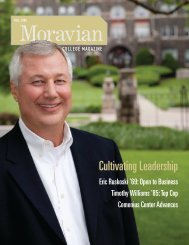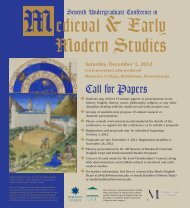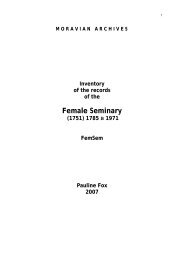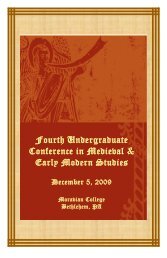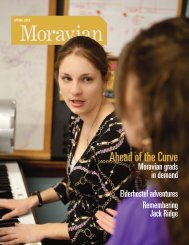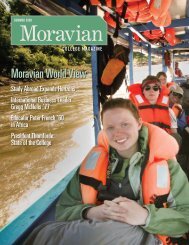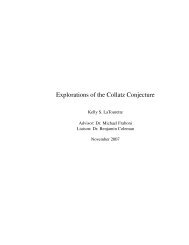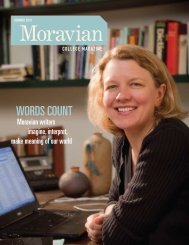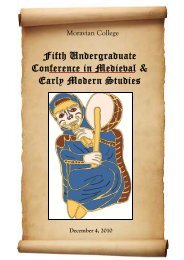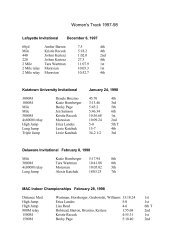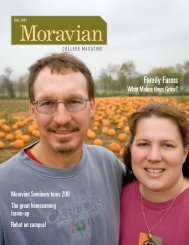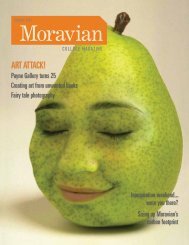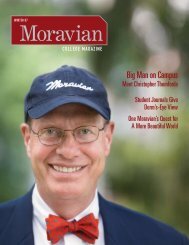Making Meaning in a Dialogic Discourse Diary - Moravian College
Making Meaning in a Dialogic Discourse Diary - Moravian College
Making Meaning in a Dialogic Discourse Diary - Moravian College
Create successful ePaper yourself
Turn your PDF publications into a flip-book with our unique Google optimized e-Paper software.
RE-FORMING WRITING INSTRUCTION<br />
Joseph M. Shosh<br />
<strong>Mak<strong>in</strong>g</strong> <strong>Mean<strong>in</strong>g</strong> <strong>in</strong> a <strong>Dialogic</strong><br />
<strong>Discourse</strong> <strong>Diary</strong><br />
Dissatisfied with his method of teach<strong>in</strong>g composition to high school seniors, Joseph M. Shosh sought<br />
ways to move from teach<strong>in</strong>g as transmission to teach<strong>in</strong>g as transaction. Ask<strong>in</strong>g students to use a<br />
dialogic discourse diary resulted <strong>in</strong> improved th<strong>in</strong>k<strong>in</strong>g and writ<strong>in</strong>g. He offers the assignments he<br />
gave and documents students’ reactions and growth.<br />
As a beg<strong>in</strong>n<strong>in</strong>g teacher of composition,<br />
I failed my students miserably.<br />
I did as I was told and explicitly<br />
taught the structure of narrative,<br />
descriptive, and expository paragraphs <strong>in</strong> preparation<br />
for that ma<strong>in</strong>stay of so many secondary English<br />
classrooms—the five-paragraph essay. Most students,<br />
<strong>in</strong> turn, did as they were told and drafted the<br />
writ<strong>in</strong>g that I had assigned, produc<strong>in</strong>g enough of<br />
what they thought I wanted to allow them to eke<br />
out the credit needed to “pass.” They didn’t seem<br />
to expect school writ<strong>in</strong>g assignments to be particularly<br />
mean<strong>in</strong>gful, and many were conv<strong>in</strong>ced that<br />
good writers are born—not made—anyway.<br />
Unwitt<strong>in</strong>gly, I had asked students to pen what<br />
British educator and writ<strong>in</strong>g researcher James Britton<br />
and his colleagues would likely have called dummy<br />
runs, or exercises for students to demonstrate their<br />
ability to perform a given task (104–05). When the<br />
dummy runs produced un<strong>in</strong>spired writ<strong>in</strong>g, I pulled<br />
out my trusty red pen and responded with a barrage<br />
of awks, frags, and dang mods on students’ papers and<br />
with grammar m<strong>in</strong>ilessons designed to confront surface<br />
errors. Authority had been placed <strong>in</strong> me, or so I<br />
believed at the time, to teach the conventions of standard<br />
written English and the expected form for <strong>in</strong>dividual<br />
paragraphs and multiparagraph essays.<br />
Blam<strong>in</strong>g the Students<br />
I was conv<strong>in</strong>ced that the students were simply be<strong>in</strong>g<br />
lazy and careless, so I brought out a list of common<br />
“errors” that my high school English teachers had<br />
given to me. The list, ironically titled “Too Air iz Humane,”<br />
<strong>in</strong>cluded twenty unforgivable s<strong>in</strong>s, rang<strong>in</strong>g<br />
from us<strong>in</strong>g first-person pronouns to mak<strong>in</strong>g subjectverb<br />
agreement errors. Now the students were forewarned.<br />
These were the errors I expected them to<br />
avoid, and, to their credit, most tried to do so. At the<br />
end of one school year, a lone student confided, “Well,<br />
Mr. Shosh, you took off a po<strong>in</strong>t for every mistake that<br />
was on the list. It didn’t take us long to figure out<br />
that what you wanted were simple sentences. That<br />
way we couldn’t make any of those dreaded mistakes!<br />
Why is it that English teachers almost always care<br />
less about what students say than how they say it?”<br />
I admitted defeat. Why was teach<strong>in</strong>g others to<br />
write so much more difficult than I had imag<strong>in</strong>ed?<br />
Why weren’t my well-<strong>in</strong>tentioned lessons actually<br />
help<strong>in</strong>g most students? At<br />
this beg<strong>in</strong>n<strong>in</strong>g po<strong>in</strong>t <strong>in</strong> my<br />
teach<strong>in</strong>g career, only the success<br />
I was experienc<strong>in</strong>g with<br />
students as the extracurricular<br />
drama director kept me <strong>in</strong> the<br />
classroom. I pondered why one<br />
group of students would freely<br />
give up valued social time to<br />
Why was teach<strong>in</strong>g others<br />
to write so much more<br />
difficult than I had<br />
imag<strong>in</strong>ed? Why weren’t<br />
my well-<strong>in</strong>tentioned<br />
lessons actually help<strong>in</strong>g<br />
most students?<br />
rehearse for three hours every day after school and then<br />
return on weekends to build sets, sew costumes, and<br />
write copy for the program, while another group of<br />
students didn’t seem to care enough to write a decent<br />
paragraph. I came to realize that the students were<br />
the same people <strong>in</strong> both environments, but I was<br />
quite different. To conv<strong>in</strong>ce my <strong>in</strong>-school students to<br />
care enough about what they had to say to want to<br />
English Journal Vol. 94, No. 1 September 2004<br />
53
<strong>Mak<strong>in</strong>g</strong> <strong>Mean<strong>in</strong>g</strong> <strong>in</strong> a <strong>Dialogic</strong> <strong>Discourse</strong> <strong>Diary</strong><br />
follow my rules, tips, and techniques, I would need<br />
to reconceptualize my role as teacher.<br />
Mov<strong>in</strong>g from Transmission<br />
to Transaction<br />
Dur<strong>in</strong>g the school day, I had viewed my role largely<br />
as a transmitter of “authoritative discourse,” without<br />
acknowledg<strong>in</strong>g, accept<strong>in</strong>g, and honor<strong>in</strong>g students’ exist<strong>in</strong>g<br />
ways with words, or their “<strong>in</strong>ternally persuasive<br />
discourse” (Bakht<strong>in</strong> 342). In marked contrast to<br />
tell<strong>in</strong>g students what to write and how to write it dur<strong>in</strong>g<br />
the day, after school I encouraged students to play<br />
with language as we studied<br />
In marked contrast to<br />
subtext to br<strong>in</strong>g our characters<br />
tell<strong>in</strong>g students what<br />
to life. In English class, we followed<br />
the rules; at play re-<br />
to write and how to write<br />
it dur<strong>in</strong>g the day, after hearsal, we reveled <strong>in</strong> break<strong>in</strong>g<br />
school I encouraged them. Dur<strong>in</strong>g the day, we recited<br />
and imitated. After<br />
students to play with<br />
language as we studied<br />
school, we improvised and<br />
questioned. In class we avoided<br />
subtext to br<strong>in</strong>g our<br />
struggle. Out of class we created<br />
characters to life.<br />
art only through our struggle to<br />
do so. Bakht<strong>in</strong> expla<strong>in</strong>s, “The importance of struggl<strong>in</strong>g<br />
with another’s discourse, its <strong>in</strong>fluence <strong>in</strong> the history<br />
of an <strong>in</strong>dividual’s com<strong>in</strong>g to ideological<br />
consciousness, is enormous. One’s own discourse and<br />
one’s own voice, although born of another or dynamically<br />
stimulated by another, will sooner or later beg<strong>in</strong><br />
to liberate themselves from the authority of the other’s<br />
discourse” (348). Hence, I faced<br />
Students agreed almost<br />
the challenge of creat<strong>in</strong>g multiple<br />
opportunities for students to<br />
unanimously that schools<br />
needed to teach them dialogue with authorized discourse<br />
<strong>in</strong> ways that were per-<br />
how to write essays,<br />
critiques, and research sonally mean<strong>in</strong>gful to them. To<br />
reports—but <strong>in</strong> ways that help students beg<strong>in</strong> to enjoy the<br />
struggle, I would need to give<br />
went beyond imitation<br />
up most of my monologues and<br />
and regurgitation.<br />
teach students to write and<br />
th<strong>in</strong>k through question<strong>in</strong>g themselves and others. In<br />
the words of the liberatory Brazilian educator Paulo<br />
Freire, I would need to “abandon the educational goal<br />
of deposit-mak<strong>in</strong>g and replace it with the pos<strong>in</strong>g of<br />
the problems” (79).<br />
Introduc<strong>in</strong>g the <strong>Dialogic</strong> <strong>Discourse</strong> <strong>Diary</strong><br />
A crucial new assignment to help me replace my transmission<br />
approach was the dialogic discourse diary.<br />
Rather than lectur<strong>in</strong>g students about my expectations,<br />
as had become the norm <strong>in</strong> my standards-based, rubricdriven<br />
high school English department and <strong>in</strong> my<br />
classroom, I began by attempt<strong>in</strong>g to create genu<strong>in</strong>e dialogue.<br />
I asked the class of twenty-eight seniors to describe<br />
their school writ<strong>in</strong>g experiences. Everyone had<br />
a story to share, and most were not flatter<strong>in</strong>g. Sarah’s<br />
was typical. “I love to express my op<strong>in</strong>ions, even play<br />
with words,” she said. “My least favorite work of writ<strong>in</strong>g<br />
is without a doubt the research paper. It’s the most<br />
un<strong>in</strong>terest<strong>in</strong>g, tedious, emotionless waste of language<br />
there is. The problem stems from the lack of personality<br />
and <strong>in</strong>dividual ideas.” Ryan agreed, add<strong>in</strong>g, “I<br />
love writ<strong>in</strong>g where you’re allowed to express yourself.<br />
Words and sentences just seem to flow.” The students’<br />
stories captured the tension they felt between want<strong>in</strong>g<br />
to share their ideas and feel<strong>in</strong>g unable to do so through<br />
traditional English assignments. Students agreed almost<br />
unanimously that schools needed to teach them<br />
how to write essays, critiques, and research reports—<br />
but <strong>in</strong> ways that went beyond imitation and regurgitation.<br />
As writ<strong>in</strong>g teacher and researcher George<br />
Hillocks Jr. rem<strong>in</strong>ds us, “If we are seriously concerned<br />
with the teach<strong>in</strong>g of writ<strong>in</strong>g, we must ensure that <strong>in</strong>quiry<br />
is <strong>in</strong>corporated <strong>in</strong>to our model of what writ<strong>in</strong>g<br />
<strong>in</strong>volves” (15).<br />
I expla<strong>in</strong>ed to students that I hoped our new<br />
assignment, the dialogic discourse diary, would help<br />
us beg<strong>in</strong> to bridge the gap between what they<br />
wanted to say (Bakht<strong>in</strong>’s <strong>in</strong>ternally persuasive discourse)<br />
and the sanctioned format for do<strong>in</strong>g so<br />
(Bakht<strong>in</strong>’s authorized discourse) by provid<strong>in</strong>g a space<br />
for genu<strong>in</strong>e <strong>in</strong>quiry and reflection. Be<strong>in</strong>g able to<br />
record and comment on the events of their last year<br />
<strong>in</strong> high school <strong>in</strong> a diary seemed almost too good to<br />
be true, but a sense of unease pervaded the room as<br />
questions came from every corner. How long does it<br />
have to be? Do we have to write every night? How<br />
can you possibly grade somebody on a diary? What<br />
do you mean by dialogic discourse?<br />
My first <strong>in</strong>cl<strong>in</strong>ation was to tell students what<br />
I wanted, but I stopped myself and responded with<br />
another question. “Well, what is discourse?”<br />
Silence.<br />
“Oh, you mean like sex, <strong>in</strong>tercourse? Cool, we<br />
can write about our sex lives.”<br />
Laughter.<br />
“No, but you’re on to someth<strong>in</strong>g here. It’s<br />
about you, but it’s not just about you. Look at the<br />
prefix di.”<br />
54 September 2004
Joseph M. Shosh<br />
“Oh, yeah. Two. It does take two to do the nasty.”<br />
More laughter.<br />
“So you mean like two people hav<strong>in</strong>g, uh, a<br />
conversation?”<br />
“That’s right! The diary will be a place for you<br />
to have conversations on paper—not just any conversations,<br />
but dialogic conversations.”<br />
Silence aga<strong>in</strong>.<br />
“Well, <strong>in</strong> a regular diary it’s only about you<br />
and what you do and what you th<strong>in</strong>k, and <strong>in</strong> a conversation,<br />
especially with our friends, we might converse<br />
without really engag<strong>in</strong>g <strong>in</strong> dialogue.”<br />
“I th<strong>in</strong>k I get it. You mean like push<strong>in</strong>g ourselves<br />
to see th<strong>in</strong>gs from a different angle, maybe even<br />
somebody else’s po<strong>in</strong>t of view that we don’t agree with.”<br />
“Exactly! We’ll use the diary as a place where<br />
we can write to learn about ourselves, our beliefs,<br />
and our writ<strong>in</strong>g. Th<strong>in</strong>k of the diary as a place to play<br />
with ideas that we’ll talk more about <strong>in</strong> class and<br />
even, <strong>in</strong> some cases, write about <strong>in</strong> larger papers for<br />
an outside audience.”<br />
Negotiat<strong>in</strong>g Criteria and Gett<strong>in</strong>g Started<br />
Through cont<strong>in</strong>ued discussion we agreed that hav<strong>in</strong>g<br />
to write an entry every day might quickly become<br />
tedious, but there needed to be a m<strong>in</strong>imum<br />
number of entries per week. We settled on two,<br />
and I would provide the prompts. Students were<br />
free to add entries, but I cautioned them that the<br />
diary was a school assignment and as such I would<br />
be bound to report violations of school policy or<br />
law that they chose to write about as part of this<br />
assignment. I also rem<strong>in</strong>ded students that when<br />
we commit our thoughts to paper, even <strong>in</strong> an exploratory,<br />
writ<strong>in</strong>g-to-learn context, there exists the<br />
possibility that someone else may stumble upon<br />
what we’ve written and read without our consent.<br />
Words spoken <strong>in</strong> air might fade with the pass<strong>in</strong>g<br />
breath, but words committed to paper are different;<br />
they have a certa<strong>in</strong> permanence and are no<br />
longer exclusively our own.<br />
I would collect and respond to those entries written<br />
to my prompts as well as any others that students<br />
wanted to share. Once each mark<strong>in</strong>g period, students<br />
would also pen a self-evaluation of that quarter’s diary<br />
entries, <strong>in</strong> which they would <strong>in</strong>clude their criteria for<br />
evaluation and evidence that they had met those criteria.<br />
If their writ<strong>in</strong>g conv<strong>in</strong>ced me, I recorded the selfassigned<br />
grade. If it did not, the student and I would<br />
meet <strong>in</strong> an after-school conference to discuss the criteria<br />
and evidence that they had provided.<br />
I asked students to beg<strong>in</strong> the diary by creat<strong>in</strong>g<br />
def<strong>in</strong>itions of literature and to consider those def<strong>in</strong>itions<br />
<strong>in</strong> light of the self-selected contemporary novels<br />
that they had recently f<strong>in</strong>ished read<strong>in</strong>g. Laurel, who<br />
confessed to dislik<strong>in</strong>g English s<strong>in</strong>ce her elementary<br />
school days <strong>in</strong> the “Blackbirds,” or lowest read<strong>in</strong>g<br />
group, began her entry: “Literature is a hard th<strong>in</strong>g for<br />
me to def<strong>in</strong>e; I’ve become so accustomed to hav<strong>in</strong>g<br />
people tell me what books I should read because they<br />
are samples of good literature that I have never really<br />
thought about what literature actually is before. For<br />
me, literature has to be well written . . . and it must reveal<br />
some important theme or mean<strong>in</strong>g. Us<strong>in</strong>g my def<strong>in</strong>ition,<br />
I don’t consider Douglas Adams’ Hitchhiker’s<br />
Guide to the Galaxy to be literature.”<br />
I had purposely started with a prompt that<br />
would get students to commit<br />
their beliefs or their <strong>in</strong>ternally<br />
persuasive discourse<br />
to paper. Then, once we discussed<br />
these beliefs, we challenged<br />
our th<strong>in</strong>k<strong>in</strong>g by<br />
read<strong>in</strong>g a brief excerpt from<br />
Terry Eagleton’s Literary Theory:<br />
An Introduction. Laurel<br />
concluded that her def<strong>in</strong>ition<br />
would need further revision<br />
s<strong>in</strong>ce she had made a dist<strong>in</strong>ction<br />
between good literature<br />
and bad literature as opposed<br />
What was most important<br />
to me was not whose<br />
def<strong>in</strong>ition of literature<br />
students ultimately<br />
accepted but their<br />
awaken<strong>in</strong>g realization<br />
that they had the right<br />
to def<strong>in</strong>e it for<br />
themselves and to<br />
debate the merits of the<br />
def<strong>in</strong>itions of others.<br />
to the literary and nonliterary. Ryan, who questioned<br />
his abilities <strong>in</strong> English class, concluded his entry, “My<br />
understand<strong>in</strong>g now is that whatever social group is <strong>in</strong><br />
power has the right to decide what is considered literature<br />
and what is not. Accord<strong>in</strong>g to my own def<strong>in</strong>ition<br />
Ian Flem<strong>in</strong>g’s Doctor No is literature, but to the<br />
powers that be, I’m afraid it is not.” Katie, confident<br />
<strong>in</strong> herself as a reader and writer, added, “Eagleton’s article<br />
does not challenge my th<strong>in</strong>k<strong>in</strong>g; it merely confirms<br />
my belief that everyone may have a different<br />
def<strong>in</strong>ition of literature. I have long known that my def<strong>in</strong>ition<br />
of literature is different than the school’s def<strong>in</strong>ition.<br />
If I had my way, we’d be read<strong>in</strong>g more science<br />
fiction and fantasy; however the school district doesn’t<br />
view many works <strong>in</strong> this genre as literature.”<br />
What was most important to me was not whose<br />
def<strong>in</strong>ition of literature students ultimately accepted<br />
but their awaken<strong>in</strong>g realization that they had the right<br />
English Journal<br />
55
<strong>Mak<strong>in</strong>g</strong> <strong>Mean<strong>in</strong>g</strong> <strong>in</strong> a <strong>Dialogic</strong> <strong>Discourse</strong> <strong>Diary</strong><br />
to def<strong>in</strong>e it for themselves and to debate the merits of<br />
the def<strong>in</strong>itions of others. Freire po<strong>in</strong>ts out that<br />
“[b]ecause dialogue is an encounter among women and<br />
men who name the world, [there] must not be a situation<br />
where some name on behalf of others” (89) and<br />
that “true dialogue cannot exist unless the dialoguers<br />
engage <strong>in</strong> critical th<strong>in</strong>k<strong>in</strong>g” (92).<br />
Writ<strong>in</strong>g <strong>in</strong> Analytic Modes<br />
These first entries represented two of the five types of<br />
responses that I attempted to elicit from students to<br />
engage them <strong>in</strong> nam<strong>in</strong>g their world for themselves<br />
and th<strong>in</strong>k<strong>in</strong>g critically about that world. In the first,<br />
an analytic <strong>in</strong>ductive entry, students analyzed their<br />
prior experiences with works they considered to be<br />
literary and nonliterary and built their def<strong>in</strong>ition<br />
accord<strong>in</strong>gly. The<br />
second I classified<br />
as analytic deductive<br />
because students<br />
made mean<strong>in</strong>g of<br />
Terry Eagleton’s<br />
def<strong>in</strong>ition of literature<br />
before apply<strong>in</strong>g<br />
his criteria<br />
to their own. In a<br />
subsequent analytic<br />
<strong>in</strong>ductive entry, I<br />
asked students to<br />
Photo by Ted Nellen.<br />
def<strong>in</strong>e chivalry as they experienced the concept <strong>in</strong><br />
childhood stories, movies, and their lives. In a companion<br />
analytic deductive entry, they applied those<br />
criteria to the medieval Sir Gawa<strong>in</strong>. These analytic<br />
Allow<strong>in</strong>g students to<br />
pose questions and offer<br />
up prelim<strong>in</strong>ary<br />
hypotheses was crucial to<br />
the creation of a culture<br />
of <strong>in</strong>quiry that propelled<br />
students to want to<br />
cont<strong>in</strong>ue to read, write,<br />
research, and learn.<br />
entries <strong>in</strong> the dialogic discourse<br />
diary often served as<br />
exploratory prewrites that students<br />
later developed <strong>in</strong>to fulllength<br />
papers.<br />
Whether they could dist<strong>in</strong>guish<br />
between deductive or<br />
<strong>in</strong>ductive modes of analysis<br />
didn’t concern me as long as<br />
they shared how they felt, and<br />
why, as they considered their<br />
ideas <strong>in</strong> a dialectic with the ideas of their peers and<br />
the texts they read. What did matter was that I provided<br />
as many educative experiences as possible to<br />
help students engage <strong>in</strong> dialogue with a variety of<br />
mean<strong>in</strong>gful texts (Dewey 25). Hav<strong>in</strong>g discussed and<br />
written about modernism <strong>in</strong> twentieth-century<br />
British literature, for example, students enjoyed explor<strong>in</strong>g<br />
the concept visually as well. Our class<br />
planned a trip to New York City’s Guggenheim<br />
Museum, and students wrote about works of art <strong>in</strong><br />
ways that mattered to them. Katie, who recognized<br />
that the school district chose to def<strong>in</strong>e literature differently<br />
than she did, also enjoyed th<strong>in</strong>k<strong>in</strong>g about<br />
why various artists had made their respective<br />
choices. Ponder<strong>in</strong>g Robert Delaunay’s Eiffel Tower<br />
with Trees, Katie questioned the art as she would a<br />
text, conjectured a response, and posed a work<strong>in</strong>g<br />
hypothesis based on her understand<strong>in</strong>g of this pa<strong>in</strong>t<strong>in</strong>g<br />
<strong>in</strong> the context of modernism, writ<strong>in</strong>g <strong>in</strong> her<br />
diary, “I don’t know why [Delaunay] chose to portray<br />
the Eiffel Tower bent out of proportion or<br />
why he chose to<br />
frame it with<br />
trees. Maybe it<br />
was just to show<br />
us a different<br />
way of look<strong>in</strong>g<br />
at an all too familiar<br />
object. I<br />
suppose that’s<br />
what most modern<br />
artists are<br />
try<strong>in</strong>g to do <strong>in</strong><br />
one way or another.”<br />
Respond<strong>in</strong>g to Picasso’s Fourteenth of July <strong>in</strong><br />
the same entry, Katie concluded, “It made me<br />
th<strong>in</strong>k—a quality I appreciate <strong>in</strong> any work of art,<br />
whether it be a written work or a visual work.”<br />
Before I could ask Katie and her peers to take<br />
on the authoritative voice demanded by the thesisbased<br />
essay or research report, I needed to provide<br />
multiple opportunities for them to ask “Why?” and<br />
ponder the possibilities. As English educator John<br />
S. Mayher po<strong>in</strong>ts out, “The important issue is to f<strong>in</strong>d<br />
out what mean<strong>in</strong>g the student has made, and to help<br />
her reflect on why she has made the mean<strong>in</strong>g she has,<br />
not to weigh <strong>in</strong> with our superior response, which<br />
usually has the effect of further alienat<strong>in</strong>g precisely<br />
those readers [and writers] who most need encouragement<br />
and support if they are to cont<strong>in</strong>ue to engage<br />
<strong>in</strong> the process” (222). Allow<strong>in</strong>g students to pose<br />
questions and offer up prelim<strong>in</strong>ary hypotheses was<br />
crucial to the creation of a culture of <strong>in</strong>quiry that<br />
56 September 2004
Joseph M. Shosh<br />
propelled students to want to cont<strong>in</strong>ue to read,<br />
write, research, and learn.<br />
Writ<strong>in</strong>g <strong>in</strong> Reflective Modes<br />
Two additional types of entries that helped students<br />
bridge the dialogic gulf between Bakht<strong>in</strong>’s <strong>in</strong>ternally<br />
persuasive discourse and authoritative discourse were<br />
the reflective textual and reflective procedural entries. Recogniz<strong>in</strong>g<br />
that students would face read<strong>in</strong>g challenges<br />
with limited textual supports, I designed a series of<br />
reflective textual prompts. Where once I would have<br />
assigned study-guide questions or adm<strong>in</strong>istered a<br />
plot-based pop quiz, I now devised prompts to help<br />
students make mean<strong>in</strong>g <strong>in</strong> transactions between<br />
reader and text. For Beckett’s Endgame and Shakespeare’s<br />
Hamlet, for example, students selected quotes<br />
that were mean<strong>in</strong>gful or puzzl<strong>in</strong>g and pondered their<br />
significance. For Defoe’s Moll Flanders and Virg<strong>in</strong>ia<br />
Woolf’s “The Legacy,” they read and responded as<br />
fem<strong>in</strong>ist critics and defenders of patriarchal tradition.<br />
The ensu<strong>in</strong>g class discussions, based on what students<br />
had written <strong>in</strong> their diaries, were lively and <strong>in</strong>sightful<br />
and clearly demonstrated that we did not need experts<br />
to pose questions for us.<br />
The reflective procedural entries asked students<br />
to reflect metacognitively, or to th<strong>in</strong>k about their<br />
th<strong>in</strong>k<strong>in</strong>g, writ<strong>in</strong>g, <strong>in</strong>teractions with peers, and growth<br />
over time. I provided prompts to lead students to<br />
comment on how their th<strong>in</strong>k<strong>in</strong>g had changed between<br />
a first read<strong>in</strong>g and a second read<strong>in</strong>g of a text;<br />
how their writ<strong>in</strong>g was stronger <strong>in</strong> a later draft of a<br />
formal paper than an earlier draft; what they had contributed<br />
to a group project and how they would approach<br />
that same project differently <strong>in</strong> the future; and<br />
how they had grown as readers, writers, listeners, and<br />
critical th<strong>in</strong>kers s<strong>in</strong>ce the beg<strong>in</strong>n<strong>in</strong>g of their senior<br />
year <strong>in</strong> high school. Students enjoyed keep<strong>in</strong>g a<br />
record of their exploits as they created video renditions<br />
of one of Chaucer’s The Canterbury Tales just as<br />
they enjoyed writ<strong>in</strong>g about “lost youth” as their senior<br />
year drew to a close. Entries that asked students<br />
to self-evaluate their learn<strong>in</strong>g process with a grade as<br />
well as narrative commentary seemed more forced<br />
and less <strong>in</strong>sightful than those where students could<br />
genu<strong>in</strong>ely write for learn<strong>in</strong>g rather than evaluation.<br />
Many, though, appreciated the opportunity to evaluate.<br />
Ryan commented, “I have found that when I<br />
grade myself and I have to expla<strong>in</strong> why I deserve a<br />
grade, I end up really hav<strong>in</strong>g to th<strong>in</strong>k about what I’ve<br />
done. When writ<strong>in</strong>g what grade I deserve, I am not<br />
writ<strong>in</strong>g to the teacher; rather I am writ<strong>in</strong>g to myself.<br />
Often, this makes me work harder until I’m conv<strong>in</strong>ced<br />
I deserve the grade I want.”<br />
Play<strong>in</strong>g with Language<br />
The f<strong>in</strong>al category of entries was creative generative,<br />
where students could use the diary as a place to play<br />
with language, ideas, and images. Students translated<br />
Middle English <strong>in</strong>to contemporary prose; tried their<br />
hand at sonnet creation; wrote poetry based on personal<br />
experiences; tried out the voices of book reviewers<br />
and theater critics; and drew diagrams,<br />
doodles, and portraits of literary lum<strong>in</strong>aries. Matt reveled<br />
<strong>in</strong> reread<strong>in</strong>g his entries and creat<strong>in</strong>g witty titles<br />
from “Well It A<strong>in</strong>’t Bulletproof,<br />
But It’s Still a Strong Paper” to<br />
“The Play That I Wish That<br />
Wasn’t,” where he lamented<br />
that “The Dead” from James<br />
Joyce’s Dubl<strong>in</strong>ers was transformed<br />
<strong>in</strong>to a Broadway musical.<br />
In one of his typically<br />
irreverent pieces, Matt texttapped<br />
the Bible to create his “If<br />
Only We’d Gone First,” which<br />
started as follows: “In the beg<strong>in</strong>n<strong>in</strong>g<br />
there was an idea and<br />
the idea was good and the group<br />
Entries that asked<br />
students to self-evaluate<br />
their learn<strong>in</strong>g process<br />
with a grade as well as<br />
narrative commentary<br />
seemed more forced and<br />
less <strong>in</strong>sightful than<br />
those where students<br />
could genu<strong>in</strong>ely write<br />
for learn<strong>in</strong>g rather<br />
than evaluation.<br />
smiled upon the idea and gave it form (and signed up<br />
for some free space from angelfire.com). Then the<br />
group created code and a homepage along with some<br />
open<strong>in</strong>g graphics. Other parts of the project were delegated.<br />
The group smiled on this and it was good.”<br />
While Matt’s self-critique of his project fit<br />
neatly <strong>in</strong>to my creative generative category, it could<br />
just as easily have been labeled analytic <strong>in</strong>ductive<br />
s<strong>in</strong>ce Matt created his criteria for evaluation; analytic<br />
deductive for provid<strong>in</strong>g evidence to support his criteria;<br />
reflective textual for f<strong>in</strong>d<strong>in</strong>g new mean<strong>in</strong>gs <strong>in</strong> a<br />
hypertext of his creation; and, of course, reflective procedural<br />
for self-assess<strong>in</strong>g his and his group’s creative<br />
processes. Sometimes our classification schemes can enhance<br />
our understand<strong>in</strong>g of another’s authoritative<br />
discourse, as I hope the categories I have presented<br />
have begun to do here. Sometimes, though, our classification<br />
schemes can set up false boundaries that get<br />
English Journal<br />
57
<strong>Mak<strong>in</strong>g</strong> <strong>Mean<strong>in</strong>g</strong> <strong>in</strong> a <strong>Dialogic</strong> <strong>Discourse</strong> <strong>Diary</strong><br />
<strong>in</strong> the way of our <strong>in</strong>ternally persuasive discourse and<br />
distance us from the authoritative discourse we’re<br />
supposed to learn. I know this was the case for many<br />
of the students when I taught exposition, narration,<br />
description, and the five-paragraph essay as dist<strong>in</strong>ct<br />
forms with “to err is human” rules to be followed<br />
and punishment to be meted out to those who<br />
<strong>in</strong>evitably made mistakes. Therefore, I didn’t share<br />
my classification of entries with students. Each entry<br />
required the student to engage with ideas and write<br />
to learn more about those ideas by dialogu<strong>in</strong>g with<br />
the self before writ<strong>in</strong>g for an external audience.<br />
The dialogic discourse diary didn’t replace formal<br />
essays or the research report. Students composed<br />
Students used the diary<br />
as a sketchpad, a<br />
playground, and a<br />
sound<strong>in</strong>g board to<br />
conv<strong>in</strong>ce themselves<br />
they had someth<strong>in</strong>g<br />
worthwhile to say and to<br />
try out a variety of modes<br />
of analysis and reflection<br />
that would serve them<br />
when they needed and<br />
wanted to sound<br />
authoritative <strong>in</strong> the<br />
formal papers.<br />
a major paper each quarter, <strong>in</strong>clud<strong>in</strong>g<br />
a thematic analysis, a<br />
comparison/contrast essay, a<br />
book review, and a reflective narrative.<br />
Students used the diary<br />
as a sketchpad, a playground,<br />
and a sound<strong>in</strong>g board to conv<strong>in</strong>ce<br />
themselves they had someth<strong>in</strong>g<br />
worthwhile to say and to<br />
try out a variety of modes of<br />
analysis and reflection that<br />
would serve them when they<br />
needed and wanted to sound authoritative<br />
<strong>in</strong> the formal papers.<br />
Stacy, who graduated at the top<br />
of her senior class, said it this<br />
way: “When it comes to writ<strong>in</strong>g,<br />
I used to dread it. There was noth<strong>in</strong>g worse than<br />
sitt<strong>in</strong>g down <strong>in</strong> front of my computer and try<strong>in</strong>g to<br />
organize my ideas <strong>in</strong>to three body paragraphs with a<br />
topic sentence and three support<strong>in</strong>g details. I don’t like<br />
writ<strong>in</strong>g when it seems forced, and that’s why the diary<br />
entries are my favorite. I actually like writ<strong>in</strong>g research<br />
papers, too, as long as I pick the topic. I never used to<br />
have a lot of confidence <strong>in</strong> my writ<strong>in</strong>g, but I do now.”<br />
When we ask students to compose f<strong>in</strong>al drafts<br />
<strong>in</strong> an authoritative voice without provid<strong>in</strong>g ample<br />
opportunities for them to th<strong>in</strong>k through their<br />
ideas, they resist the externally imposed structure.<br />
Nick, who had a particularly negative experience<br />
<strong>in</strong> his junior English class, concluded his<br />
diary as follows:<br />
First of all, my relationship with language and literature<br />
has gone from a hatred and a belief they are<br />
the “Devil’s work” to writ<strong>in</strong>g a sonnet for the heck<br />
of it and read<strong>in</strong>g a book that I don’t have to. I’ve<br />
come to enjoy writ<strong>in</strong>g that shares my op<strong>in</strong>ions and<br />
thoughts. I feel that this is the only true type of<br />
paper because I’m shar<strong>in</strong>g my op<strong>in</strong>ions and orig<strong>in</strong>al<br />
ideas—not somebody else’s. When I write these<br />
types of papers I write better, clearer, and even<br />
ahead of time.<br />
I still struggle with my nondialogic ways. It’s<br />
easier to avoid the struggle and to teach by tell<strong>in</strong>g<br />
monologically rather than to teach and learn by<br />
pos<strong>in</strong>g problems dialogically. Freire rem<strong>in</strong>ds me,<br />
however, that <strong>in</strong> a problem-pos<strong>in</strong>g education, “[t]he<br />
students—no longer docile listeners—are now critical<br />
co-<strong>in</strong>vestigators <strong>in</strong> dialogue with the teacher”<br />
(81). Fortunately, as I have written to make mean<strong>in</strong>g<br />
of my teach<strong>in</strong>g practices, students have been my<br />
most able teachers.<br />
Works Cited<br />
Bakht<strong>in</strong>, M. M. The <strong>Dialogic</strong> Imag<strong>in</strong>ation. Ed. Michael Holquist.<br />
Trans. Caryl Emerson and Michael Holquist.<br />
Aust<strong>in</strong>: U of Texas P, 1981.<br />
Britton, James, Tony Burgess, Nancy Mart<strong>in</strong>, Alex McLeod,<br />
and Harold Rosen. The Development of Writ<strong>in</strong>g Abilities<br />
(11–18). London: Macmillan, 1975.<br />
Dewey, John. Experience and Education. New York: Touchstone,<br />
1938.<br />
Eagleton, Terry. Literary Theory: An Introduction. 2nd ed. M<strong>in</strong>neapolis:<br />
U of M<strong>in</strong>nesota P, 1996.<br />
Freire, Paulo. Pedagogy of the Oppressed: 30th Anniversary Edition.<br />
Trans. Myra Bergman Ramos. New York: Cont<strong>in</strong>uum,<br />
2000.<br />
Hillocks, George, Jr. Teach<strong>in</strong>g Writ<strong>in</strong>g as Reflective Practice.<br />
New York: Teachers <strong>College</strong>, 1995.<br />
Mayher, John S. Uncommon Sense: Theoretical Practice <strong>in</strong> Language<br />
Education. Portsmouth: Boynton/Cook, 1990.<br />
Joseph M. Shosh is assistant professor of education and director of the Master of Education program at <strong>Moravian</strong> <strong>College</strong>,<br />
where he teaches courses <strong>in</strong> literacy education and teacher action research. email: jshosh@moravian.edu.<br />
58 September 2004



